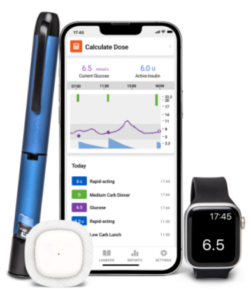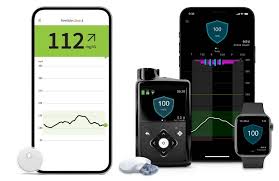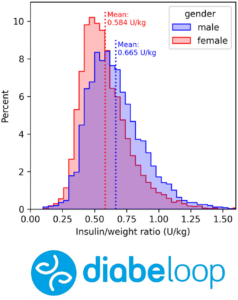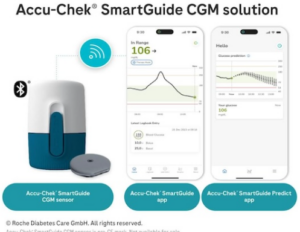FDA approves next-generation CGM with two-step insertion process by Jill Rollet for Healio.com/endocrinology, 7 August 2024.
 FDA approved Medtronic’s next-generation continuous glucose monitor for people with diabetes. The Simplera CGM (Medtronic) is a CGM that is about half the size of prior Medtronic devices. According to the release, it is Medtronic’s first disposable CGM. The system features a two-step insertion process with a sensor that does not require the user to tape the device in place.
FDA approved Medtronic’s next-generation continuous glucose monitor for people with diabetes. The Simplera CGM (Medtronic) is a CGM that is about half the size of prior Medtronic devices. According to the release, it is Medtronic’s first disposable CGM. The system features a two-step insertion process with a sensor that does not require the user to tape the device in place.
Simplera is designed to be used as part of a smart multiple daily injection system alongside Medtronic’s InPen smart insulin pen and its Simplera Sync sensor. According to the Medtronic website, the smart system will allow users to track insulin and glucose data to provide real-time insulin dosing guidance. The system is designed for integration with the Medtronic MiniMed 780G system.
Medtronic plans to submit an updated InPen app for FDA approval, which would allow it to be integrated with the Simplera CGM.
Read more: FDA approves next-generation CGM with two-step insertion process
Abbott, Medtronic partner on diabetes tech by Elise Reuter for MedTechDive.com, 7 August 2024.
 Abbott will supply Medtronic with a continuous glucose monitor that will only work with Medtronic devices. The CGM will be sold exclusively by Medtronic.
Abbott will supply Medtronic with a continuous glucose monitor that will only work with Medtronic devices. The CGM will be sold exclusively by Medtronic.
Medtronic has held a leading share of the insulin pump market but has a smaller share of the CGM space. The company fell behind after receiving a warning letter in 2021 for problems with its Minimed 600 series insulin pumps, hindering its ability to bring new diabetes devices to market. The FDA lifted the warning letter last year.
Meanwhile, Abbott, which competes with Dexcom to lead the CGM market, has recently emphasized partnerships with insulin pump firms to bring in more users with Type 1 diabetes. Abbott in January integrated its FreeStyle Libre 2 Plus sensor withTandem’s t:slim X2 insulin pump. In February, patch pump company Insulet received a CE mark to pair its Omnipod 5 pump with Abbott’s CGM.
Read more: Abbott, Medtronic partner on diabetes tech
Diabeloop study highlights disparities in insulin requirements between sexes by Sean Whooley for DrugDeliveryBusiness.com, 17 July 2024.
 Diabeloop reported results from a real-world study that demonstrated important differences between males and females in insulin requirements. The study evaluated more than 9,000 adults with type 1 diabetes across Europe. It utilized data from patients using the Diabeloop Generation 1 (DBLG1) hybrid closed-loop insulin delivery device. Investigators published findings in the Journal of Diabetes Science and Technology.
Diabeloop reported results from a real-world study that demonstrated important differences between males and females in insulin requirements. The study evaluated more than 9,000 adults with type 1 diabetes across Europe. It utilized data from patients using the Diabeloop Generation 1 (DBLG1) hybrid closed-loop insulin delivery device. Investigators published findings in the Journal of Diabetes Science and Technology.
Across multiple European countries, women made up 59% of the 9,036 participants. It had an average study period of 320 days, amassing nearly 3 million days of data. Diabeloop reports significant sex differences observed in insulin-weight ratios.
Diabeloop says the analysis provides valuable insights into the daily insulin requirements for adults with type 1 diabetes. It revealed a statistically significant 14% difference in the ratio between sexes, the company said. Diabeloop believes the findings have important implications for the practical management of insulin therapy.
The company also says its results highlight the necessity of considering sex as a crucial factor in diabetes treatment. Current treatment guidelines from American and European diabetes societies don’t have sex-specific recommendations for insulin-weight ratios.
Read more: Diabeloop study highlights disparities in insulin requirements between sexes
AI-Enhanced CGM Approved in Europe posted by diaTribe.org, 5 August 2024.
 A new continuous glucose monitor, the Accu-Chek SmartGuide, can predict the risk of hypoglycemia from 30 minutes to seven hours ahead. The device is approved for use in Europe, with future U.S. approval and availability planned. The sensor can be worn for up to 14 days.
A new continuous glucose monitor, the Accu-Chek SmartGuide, can predict the risk of hypoglycemia from 30 minutes to seven hours ahead. The device is approved for use in Europe, with future U.S. approval and availability planned. The sensor can be worn for up to 14 days.
Currently available CGMs can predict low and high blood sugars from 20 minutes up to an hour before they occur. The new Accu-Chek SmartGuide takes that concept further, predicting potential nighttime hypoglycemia up to 7 hours in advance.
The SmartGuide CGM can be worn for up to 14 days and is designed for people with type 1 and type 2 diabetes on insulin who are over 18 years old. The CGM takes a blood sugar reading every five minutes, which is displayed in the Accu-Check SmartGuide App.
A second program installed on a smartphone, the SmartGuide Predict App, uses glucose readings and historical data to show the user a curve of likely future glucose readings continuously from 30 minutes to two hours. If the system predicts a low blood sugar in the next half hour, or a nighttime low within seven hours, a push notification is sent from the app to the user’s smartphone to take action and avoid a hypoglycemic event.
The system’s predictive algorithms were developed, in part, using a form of AI called machine learning, which improves over time, to make future blood sugar readings more reliable. The company says the system calculates predictions based on historical CGM data and the time of day. The user doesn’t have to enter carbohydrates or insulin taken for the predictions to work, but if entered, the company says the forecasts will be slightly more accurate.
Read more: AI-Enhanced CGM Approved in Europe
Discover the Most Downloaded Apps to Help You by Diabetotech, 8 August 2024.
 The primary goal of this blog post is to inform you about the wide range of app options available to help people with diabetes adhere to their lifestyle goals. Many of these apps are free and accessible to both iOS and Android users, so there’s nothing to lose by giving them a try!
The primary goal of this blog post is to inform you about the wide range of app options available to help people with diabetes adhere to their lifestyle goals. Many of these apps are free and accessible to both iOS and Android users, so there’s nothing to lose by giving them a try!
Most Downloaded Diet/Carb Counting Apps
-
-
- 1. MyFitnessPal: A popular calorie tracker with a vast database of food products. Recently shifted many features to premium only. Cost: Has free trial, $19.99 / month or $79.99 / year for yearly plan
- 2. BetterMe: An all-in-one health, fitness, and wellness app acting as a virtual health coach. Costs: 7-day free trial, subscription between $9.99 to $38.95 per month
- 3. Yazio: A calorie counting app offering goal setting, recipes, and a fasting tracker. Costs: 7-days free, $3.99 per month billed annually
- 4. FatSecret: Free app for tracking food and exercise, with the largest verified database of food and nutrition information worldwide. Costs: 100% free
- 5. Fastic: Promotes weight loss through intermittent fasting, mindfulness, improved nutrition, and sleep. Costs: monthly at $4.60/week or annually at $1.92/week
- 6. Lose It! Tracks food and water intake to help users meet diet goals and lose weight. Costs: Free version and a premium subscription at $39.99 per year
- 7. Lifesum Offers calorie counting, goal setting, meal plans, recipes, and more. Costs: has free version, paid ranges from $4.17 per month to $49.99 annually
- 8. Noom Extends into behavior change programs for chronic and non-chronic health conditions. Costs: $70 per month or $209 per year
- 9. WeightWatchers: Converts nutritional information into a points system for tracking calorie intake, with virtual and in-person workshops. Costs: Basic plan costs around $10 per month if you commit to 10 months, For shorter commitments, the price can go up to $23 per month, plus a $20 starter fee. Premium plan starts around $25 per month for a 10-month commitment. Shorter commitments cost around $45 per month, also with a $20 starter fee
-
Most Downloaded Fitness Apps
-
-
- 1. Google Fit Offers customized coaching and actionable tips based on health and activity history. Costs: Free
- 2. Apple Health Collects health information from iPhones, Apple Watches, and other devices, and sets medication reminders. Costs: Free
- 3. Samsung Health: Syncs data from Samsung devices, allowing competition with other users and stress level measurement. Costs: Free, Premium: around $9.99 per month or $59.99 per year
- 4. Strava: Popular with the cycling community, featuring a competitive King of the Hill mode.Costs: Free, premium: $11.99 per month or $79.99 per year
- 5. Sweatcoin: Earn cryptocurrency for walking. Costs: Free version, Premium version costs $4.99 per month or $24.99 annually
- 6. Freeletics: Harnesses the power of AI and the expertise of human scientists to generate the best workout plan for you. Costs: Free version, Training Plan Only: $34.99 / month or $139.99 / year. Training & Nutrition Bundle: $44.99 / month or $179.99 / year
- 7. Sweat: A fitness app built for women, with a large library of female trainers and workouts. Costs: approximately $19.99 per month, or $119.94 annually
- 8. Peloton: Sells cardio equipment and offers exercise livestreams that can be followed at home. Costs: $12.99 to $44 / month
- 9. Fitbit: Recently acquired by Google, includes sensors to track heart rate, Electrodermal Activity, temperature, sleep, and menstrual cycles. Costs: Free version, around $9.99 per month or $79.99 per year
- 10. AllTrails: GPS Hiking & Biking Trail Maps. Detailed reviews and inspiration from a community of trail-goers. Helps plan and share outdoor adventures. Costs: Free version, $29.99 to $39.99 per year
-
Read more: Discover the Most Downloaded Apps to Help You


Very interesting study about gender differences in insulin requirements. I had a look at the link, and the upshot is that women need 10 to 15 percent less insulin. Thanks for posting this.
has medtronic called uncle? If so they are a victim of their own poor decision making now 15 years ago. They need some reflection. I like the G3 sensor and I assume the G4 is better, but they will never move beyond the cloud they placed themselves in.